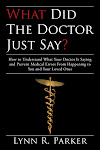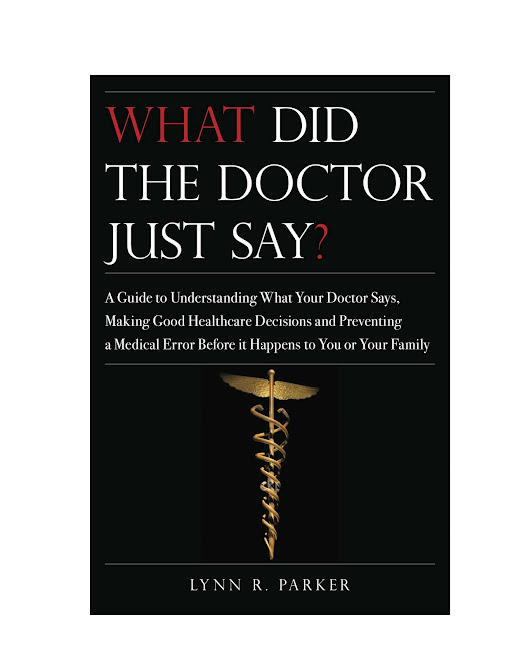Once the laws in the state of NJ and other states are finally changed and I do believe they will be. Not just because changingthese laws are good patient care, taxation of marijuana could curemany of California's and other states economic woes. I'm sure thismakes legislators at least interested in changing the laws. Once the law in your state is changed how will you select a doctor to prescribe medical marijuana.
In What Did the Doctor Just Say I write extensively about ways to talk to your doctor about your healthcare preferences and how to choose a doctor who is willing to work with you, be competent at his or her job and be respectful of you and yourchoices.
The following excerpts from the What Did the Doctor Just Say? will help you to choose just such a doctor. I have added some information specific to selecting a doctor for the purpose of marijuana prescription
The following excerpts from the What Did the Doctor Just Say? will help you to choose just such a doctor. I have added some information specific to selecting a doctor for the purpose of marijuana prescription
Chapter Four
How to Choose the Right Doctor and Get Better Care
“The good physician treats the disease; the great physician treats the patient who has the disease.”
William Osler M.D.
Looking For Dr. Right
Choosing a doctor is one of the most important decisions you will ever make. Quite literally, your life could depend upon your choice(s). If your doctor treats your condition improperly, you could be injured by the care you receive.
Before you begin the selection process, there is a concept I want you to clearly understand, and that concept is this: You are the owner of YOUR Healthcare Team and your doctors are your employees, they work for you and they make their living by collecting your insurance dollars. There is no doubt that your doctors are very important employees; nonetheless they are employees. You must be clear that your doctors work for you, otherwise you will believe they are in charge of your healthcare, and you will not be empowered to speak openly about your desire to use medical marijuana as you might feel judged and over powered by the doctors opposition to its use. You may be inclined to accept whatever the doctors choice is and that may not be the best thing for you, if you want this treatment you need to find a
who is willing to work with you.
who is willing to work with you.
When choosing a doctor, you will need to evaluate the candidates for the position in three essential categories: accessibility, skill level, and personality (bedside manner). To start the selection process, you will first need to review your insurance carrier’s list of providers and the narrow down that list to providers to those who meet your specific needs.
With a list of candidates in hand, ask your other doctors, your family members, and friends if they either recommend or discourage the use of any doctors on your list. If you know any nurses who work at your area hospitals, ask them who they would recommend. Nurses know the best and worst doctors because they have worked with many of them over time and in a variety of situations. Nurses know which doctors are competent, kind, and trustworthy, all qualities you want in a doctor, and they know the doctors who do not possess those qualities as well.
Your next step is to evaluate each candidate’s credentials and their safety records. Several reputable Internet sites can help you to verify a provider’s training, specialty certifications, and any disciplinary actions that may have been leveled against the doctor. Currently, HealthGrades.com is the most comprehensive resource for examining a doctor’s background in all of these areas. The American Medical Association also collects safety information on its members, and a handful of states gather and report malpractice information.
You want to get a list from your state board of health of providers who are able and
do prescribe medical marijuana in your state. And of course you can always search out
this information on the internet. Below are a few sites to help you begin checking the doctors
background and safety record.
- www.RateMD.com (includes patient feedback on doctors)
- www.physicianreports.com
- To find out if your state makes malpractice information available to the public, call your local Board of Health.
- Additionally many of the questions on the first worksheet can be answered by the office staff before making any appointments
After meeting with the doctor, you will want to evaluate the doctors’ bedside manner. This set of questions will help you to evaluate the doctor’s communication skills; his ablility listen and to teach and his levels of respect, kindness and empathy toward you. The combination of these qualities equal the doctors bedside manner.
· Did you feel comfortable talking with the doctor?
If the answer to this question is “no” there may be no need to go any further. Teamwork and communication are essential to delivering safe patient care. You want to choose a provider you feel comfortable talking to.
· Is the practitioner safe and knowledgeable?
In addition to being properly trained, safe practitioners are well organized and in control of the information you need to know about your condition. Usually the advice a knowledgeable provider gives will match the information you found while researching your condition on the Internet. If the doctor is disorganized and unable to give you clear answers to your questions, you have met an unsafe provider. This is not the doctor for you.
· Did the doctor respect your thoughts and opinions and encourage you to express them?
No one knows better than you do what you are experiencing. If you feel something is wrong, your thoughts, perceptions, and experiences should be respected. If the doctor discounts what you say and indicates that your perceptions are wrong, she limits your ability to add to your healthcare safety. If a doctor dismisses your experiences she is not the doctor for you.
· Did the provider answer your questions in terms you could understand?
If a doctor does not answer questions in language you can understand, you should ask her to explain her answers in plain English. If after asking her to speak in plain English you still don’t understand what the doctor said, this is probably not the doctor for you.
· Did the doctor ask questions to ensure you understood his explanation?
A good doctor knows you may not understand everything she says and will try to assess what you did and did not understand, by asking, “Do you understand and do you have any questions?
·Is the provider a good teacher?
Did the provider teach you what you need to know about your condition? Did she teach you about diet, exercise, rest, and different types of therapy, or did she only discuss medications? You are a whole person and your health depends on your overall well- being. A good doctor will give you a wholistic education.
Questions to Ask When Choosing a Doctor
· Is the provider part of your insurance plan?
Generally speaking, if the answer to this question is “no” your plan will not pay for the care rendered unless your plan allows you to use out-of-network providers. If you do not have out-of-network benefits, but need to see an out-of-network provider because he or she has specialty training, contact your insurance plans’ case manager and explain your circumstances. The case manager may be able to get you the care you need by negotiating a contract with the doctor whose expertise you need. You may incur extra costs; however, if you need the care only this doctor can provide, it may be well worth it.
· Does the clinician have the background and training you need?
In general, everyone needs a general practitioner or internist to manage their colds and flu and their minor aches and pains. For more serious problems, you many need to see a specialist. Specialists have more training and knowledge in their area of study than do general practitioners, who specialize in treating everything. If you have an uncontrolled disorder or a newly-diagnosed condition, you may want to ask your internist for a referral to a specialist.
· Is the doctor board certified?
Board certified it means the doctor has completed extra hours of clinical training and has passed a national certification examination that has earned him or her the title “board certified.” Lack of board certification does not mean the provider is not qualified to care for you. It simply means the doctor has not completed the board certification process. When searching for a specialist, probably want to eliminate providers who are not board certified and has not completed specialty training.
· Is there a long wait to get an appointment?
If you have a condition for which you need immediate attention such as a new diagnosis of cancer, out-of-control pain, or really high blood pressure, you need to be seen as soon as possible. In such cases, long waits to get an appointment are not acceptable or safe. Consider removing a provider who has really long waits from your list of candidates.
Hopefully after asking these questions you will be able to choose the best doctor for your care and the safe prescribing of medical marijuana. I hope this helps, please let me know what you think.





1 comment:
Please post your comments by clicking on the comments button. Thank you your comments are greatly appreciated
Post a Comment